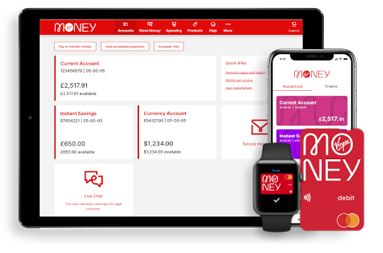Power of attorney & third party account support
Short term options
Third Party Mandate
A less formal solution to support you with your day to day banking.
What is it?
A Third Party Mandate is a straightforward way for you to confirm your intention to have a third party operate your account on your behalf and/or have access to your account information. The third party must be at least 18 years of age.
A Third Party Mandate is a straightforward way for you to confirm your intention to have a third party operate your account on your behalf and/or have access to your account information. The third party must be at least 18 years of age.
How can it support?
A Third Party Mandate can be useful if you want to appoint someone to operate your account on your behalf. You might do this if you’re unwell, going abroad, or just because you want assistance to carry out your day to day banking.
You need to complete a separate mandate for each account you appoint a third party to.
The third party can’t arrange an overdraft or open or close an account for you. Third Party Mandates are only available to customers who hold personal accounts.
A Third Party Mandate can be useful if you want to appoint someone to operate your account on your behalf. You might do this if you’re unwell, going abroad, or just because you want assistance to carry out your day to day banking.
You need to complete a separate mandate for each account you appoint a third party to.
The third party can’t arrange an overdraft or open or close an account for you. Third Party Mandates are only available to customers who hold personal accounts.
Important considerations
We encourage you to continue to monitor your accounts while you’re still mentally and physically able to do so, even when you appoint someone else to act on your behalf. If you feel you’re no longer able to monitor your accounts, please contact us for support.
Third Party Mandates let you select the level of access you want your third party to have. This means you can decide how much access they have to your account and the actions they can carry out.
A Third Party Mandate is only valid for the account specified in the mandate, and isn’t recommended if you think your mental capacity is likely to deteriorate. If you lose mental capacity, the Third Party Mandate ceases to be valid.
We encourage you to continue to monitor your accounts while you’re still mentally and physically able to do so, even when you appoint someone else to act on your behalf. If you feel you’re no longer able to monitor your accounts, please contact us for support.
Third Party Mandates let you select the level of access you want your third party to have. This means you can decide how much access they have to your account and the actions they can carry out.
A Third Party Mandate is only valid for the account specified in the mandate, and isn’t recommended if you think your mental capacity is likely to deteriorate. If you lose mental capacity, the Third Party Mandate ceases to be valid.
How to register with the bank
Please visit or make an appointment with a banking adviser at your local branch. Your appointed third party should also attend as you both need to sign the paperwork.
ID(PDF, opens in new window) If you (the donor) are an existing customer please ensure your third party brings ID to the appointment.
Please visit or make an appointment with a banking adviser at your local branch. Your appointed third party should also attend as you both need to sign the paperwork.
ID(PDF, opens in new window) If you (the donor) are an existing customer please ensure your third party brings ID to the appointment.
General Power of Attorney
A more formal approach, a Power of Attorney supports you with your day to day banking affairs, and gives a general authority for the attorney to act on other matters, unless you place specific restrictions on them.
What is it?
A General Power of Attorney is a legal document. It lets you appoint a person of your choice (the attorney) to act on your behalf.
A General Power of Attorney is a legal document. It lets you appoint a person of your choice (the attorney) to act on your behalf.
How can it support?
The General Power of Attorney lets your attorney assist with your day to day banking affairs, such as making decisions about your finances, for you, or carrying out transactions on your account. A General Power of Attorney may be suitable if you have mental capacity but are struggling with the day to day management of your account and need help in the short term. For example this might be because of:
- Illness or disability
- An extended period of time out of the country
- Being housebound or having limited mobility
The General Power of Attorney lets your attorney assist with your day to day banking affairs, such as making decisions about your finances, for you, or carrying out transactions on your account. A General Power of Attorney may be suitable if you have mental capacity but are struggling with the day to day management of your account and need help in the short term. For example this might be because of:
- Illness or disability
- An extended period of time out of the country
- Being housebound or having limited mobility
Important considerations
We encourage you to continue to monitor your accounts while you’re still mentally and physically able to do so, even when you appoint someone else to act on your behalf. If you feel you’re no longer able to monitor your accounts, please contact us for support.
A General Power of Attorney isn’t recommended if you think your mental capacity is likely to deteriorate. If you lose mental capacity, the power ceases to be valid.
There is an exception to the above rule, a General Power Of Attorney made and signed between January 1991 and April 2001 will allow an attorney to continue managing your affairs even if you do subsequently lose mental capacity, unless you had expressly forbidden this in the power itself.
With a General Power of Attorney there are no limits on the actions the attorney can carry out for you, unless you make any specific restrictions or give the attorney specific powers only.
You can appoint multiple attorneys to act jointly i.e. must act together or jointly and severally i.e. can either act together or independently of one another if they wish.
You can revoke this type of Power of Attorney at any time.
We encourage you to continue to monitor your accounts while you’re still mentally and physically able to do so, even when you appoint someone else to act on your behalf. If you feel you’re no longer able to monitor your accounts, please contact us for support.
A General Power of Attorney isn’t recommended if you think your mental capacity is likely to deteriorate. If you lose mental capacity, the power ceases to be valid.
There is an exception to the above rule, a General Power Of Attorney made and signed between January 1991 and April 2001 will allow an attorney to continue managing your affairs even if you do subsequently lose mental capacity, unless you had expressly forbidden this in the power itself.
With a General Power of Attorney there are no limits on the actions the attorney can carry out for you, unless you make any specific restrictions or give the attorney specific powers only.
You can appoint multiple attorneys to act jointly i.e. must act together or jointly and severally i.e. can either act together or independently of one another if they wish.
You can revoke this type of Power of Attorney at any time.
How to register with the bank
We won’t charge you for registering your Power of Attorney with us.
Please contact our customer services team to discuss the most convenient way to register this or pop into your local branch to discuss with one of our friendly colleagues. Please have to hand / bring these documents with you — they’ll help us speed up the process:
- The original Power of Attorney document. If you don’t have this, please bring a correctly certified copy — signed by the granter, solicitor or notary public on each page
- Account details the power is to be held on
- If you (the granter) are an existing customer, ID(PDF, opens in new window) is required for the attorney only
- If you (the granter) are not an existing customer and the attorney is opening the account on your behalf, ID(PDF, opens in new window) is required for both you (the granter) and the attorney
- Any other relevant information
We won’t charge you for registering your Power of Attorney with us.
Please contact our customer services team to discuss the most convenient way to register this or pop into your local branch to discuss with one of our friendly colleagues. Please have to hand / bring these documents with you — they’ll help us speed up the process:
- The original Power of Attorney document. If you don’t have this, please bring a correctly certified copy — signed by the granter, solicitor or notary public on each page
- Account details the power is to be held on
- If you (the granter) are an existing customer, ID(PDF, opens in new window) is required for the attorney only
- If you (the granter) are not an existing customer and the attorney is opening the account on your behalf, ID(PDF, opens in new window) is required for both you (the granter) and the attorney
- Any other relevant information
For more information, view the actions a third party or attorney can carry out when they manage the account on your behalf.
For more information, view how Powers of Attorney are revoked.
Power of attorney & third party account support
Supporting our customers
You can find impartial information and guidance on money matters on the “MoneyHelper” website.
Yorkshire Bank is covered by the Financial Services Compensation Scheme (FSCS), Find out more.


